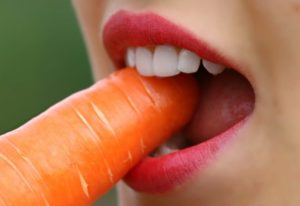Oral Hygiene and the risk of stroke. On the surface, these two concepts do not seem interrelated. In reality, along with a proper diet, your oral hygiene can be very instrumental in preventing a stroke.
I Had A Stroke in My Eye Last Weekend!
That was the statement that I heard from a patient when asking about anything new in his medicines or medical conditions. I needed an education on this topic so I asked the patient to explain what that was.
The reality of the term is really no different than any other type of stroke. According to the American Academy of Ophthalmology, an eye stroke’s most common symptom is sudden, painless vision loss. Depending on the location, it could result in total loss of vision for the entire affected eye or as in my patient’s case, it affected only part of his eye.
The Academy goes on to say that men in their sixth decade of life are the most likely to experience this. Patients with diabetes, high cholesterol, heart disease, and narrowing of the carotid artery will increase the likelihood of this happening.
So what does this have to do with teeth? I will explain that soon.
The Last Word on Saturated Fats & Your Health
In a recent article published just last week, Dr. Joel Kahn, a professor of cardiology, discussed the findings of June 15, 2017, by a Presidential Advisory from the American Heart Association. It made clear and recommended that limiting those foods high in saturated fat and included this in a large paper.
The following is part of a news release from the American Heart Association:
“Saturated fats are found in meat, full-fat dairy products and tropical oils such as coconut, palm, and others. Other types of fats include polyunsaturated fats, found in corn, soybean, peanut and other oils, and monounsaturated fats, found in olive, canola, safflower, avocado and other oils.”
They went on to discuss these types of fats. Here are some highlights of their statements:
1. Randomized controlled trials that lowered intake of dietary saturated fat and replaced it with polyunsaturated vegetable oil reduced cardiovascular disease by approximately 30 percent –similar to that achieved by cholesterol-lowering drugs, known as statins.
2. Prospective observational studies in many populations showed that lower intake of saturated fat coupled with higher intake of polyunsaturated and monounsaturated fat is associated with lower rates of cardiovascular disease.
3. Replacement of saturated fat with mostly refined carbohydrate and sugars is not associated with lower rates of cardiovascular disease(heart disease).
Dr. Kahn went on to say that this ended decades of misinformation that tried to state that this is not necessarily true. Over a century of solid scientific research has pointed to eating more fruits, vegetables and whole grains, while eliminating meat and dairy, will improve the chances of having a better quality of life for decades.
Get through your 60’s without a major health issue, & you’re in good shape
I have always said that if you can get through your 60’s without a major health issue, you were in good shape. It is this decade that years of bad habits and diets show up.
These bad habits build up plaques in the arteries. When these plaques break off and get lodged somewhere they stop the blood flow to that part of the body. In my patient’s case, it was his eye. If it gets stuck in your head, you could die or be permanently impaired due to loss of brain function. In the heart, you will get a heart attack. By eating saturated fats, these are some of the consequences associated with all of this.
A Plant-Based Diet, Oral Hygiene and The Risk Of Stroke
The game plan is obvious. Reduce the intake of these fats and replace this diet with one loaded with fruits and vegetables.
How does one enjoy all these varieties of food? It all starts with my good friends…the back molars. We need to keep our back teeth in great shape in order to ingest and digest these foods properly. Consequently, apples, walnuts, carrots etc are impossible to eat unless we can mash and smash these foods as the first step of digestion. Frequent checkups followed by being receptive to advice will keep our teeth for decades.
“It’s just a back tooth and I don’t really care” is the wrong approach. Wherever possible do everything to save your back teeth. In the event that is not a possibility for whatever reason, then replace them with something strong and stable.
The bottom line is this. Oral hygiene & the risk of stroke are related to one another. You need to incorporate good oral hygiene along with a plant-based heavy diet to reduce your risk for stroke and other related ailments. It’s not just your teeth that benefit. Your whole body does!
If you want to talk to me more about any of this information, please call me at 440.951.7856. I look forward to hearing from you.
Jeffrey Gross, DDS, FAGD is an Ohio licensed general dentist and is on the staff of Case Western Reserve School of Dental Medicine.

